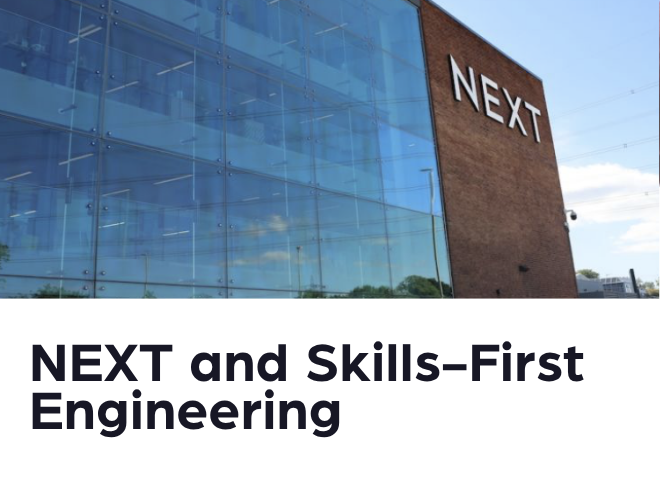Quick Facts
- Career Switch: Nuclear Submarine Engineer → Energy & Compliance Specialist
- Transferable Skills: Nuclear safety protocols, mechanical/electrical systems, rigorous compliance procedures → Energy management, regulatory compliance, multi-site operations
- Service: 5 years Royal Navy submarine service on nuclear bombers
After five years keeping nuclear submarines running beneath the waves, Jordan-Lee thought he'd have to start over in civilian life. Six years later, he's found his niche in energy and compliance at Digital Realty, and wishes he'd known sooner just how transferable his skills really were.
Submarine Life: Small World, Big Skills
Jordan-Lee served five years in the Royal Navy's submarine service, working on nuclear bombers based at Faslane before moving to a refit boat in Plymouth.
The small world of submariners taught him big skills. As one of the first trainees through the Navy's ETIC program (combining air engineering technicians and marine engineers), Jordan-Lee gained qualifications in both electrical and mechanical systems, plus the nuclear experience that would prove more valuable than he initially realised.
"All boats and all buildings are exactly the same when you think about it: incoming water, incoming gas, ventilation, electrical power distribution, and water pumps. It's all exactly the same principles."
The Reality Check: Your Skills Actually Matter
Like many veterans, Jordan-Lee left service with no clear plan and little understanding of what civilian employers actually wanted.
He initially jumped at the first Monday-to-Friday engineering job he could find, just to escape shift work. But within months, he discovered something crucial: his military training was exactly what companies were hunting for.
"I didn't realise how big CBRE was until I left. I went straight in as a day engineer at a major bank, and again, the principles were the same: water treatment, pumps, electrical, and ventilation."
The penny dropped. His submarine experience wasn't niche, it was exactly what building systems needed.
Six Years Later: Finding the Right Fit
Jordan-Lee's path to Data Centres and Digital Realty came through the tight-knit engineering network in London. After moving through various roles and building his confidence, a former boss tipped him off about opportunities in data centres.
"Data centres will do much of their electrical switching in-house, and often much more resilience compared to office blocks. This extra responsibility may come with a more attractive package," he notes. "It's such a small world in the engineering sector; everyone knows everyone, and you'll bunny hop from one thing to another through friends of friends."
He joined Digital Realty as a mechanical and electrical shift engineer before moving into his current role in energy and compliance, a position that didn't even exist at the company until last year.
The Perfect Match: Compliance Meets Engineering
Jordan-Lee's current role splits between energy management and compliance across multiple Digital Realty sites. It's a unique position that sits within day-to-day operations rather than as a separate function.
"I cover everything from PPE checks up to dealing with the Environment Agency," he explains. "There's continuous auditing for international standards and internal legal audits. The plan is to get everything set up so it's easily ready to be audited anyway."
[CALLOUT]
What Makes Digital Realty Different
For Jordan-Lee, Digital Realty offers something many engineering roles don't: the perfect balance of technical challenge and professional environment. "It's very professional but also very chilled out," he says.
Sitting somewhere between the corporate environment of an investment bank and the laid-back, typical engineering company, Digital Realty has the perfect level of professionalism with a casual vibe. Plus, the company's approach to career development particularly stands out, and employees can shape their careers in the direction they’re interested in.
"I could go either sub-regional or regional. I'm straddling two worlds: operations and head office, so I could go anywhere. That freedom and scope for progression is limitless."
His Message to Engineers
Jordan-Lee's advice is simple: stop underestimating yourselves.
"If you're an engineering technician and you think you shouldn't apply for something because you don't know the job spec, go for it anyway. There's a good chance companies will snap you up."
Essentially, the skills shortage works in veterans' favour; you’ve proven you can turn up, that you’re handy with a spanner, and you can look presentable. You’ll be snapped up as soon as you leave, but only if you put yourself out there.
The Bottom Line
Jordan-Lee's journey proves that submarine engineering skills aren't niche, they're exactly what data centre operations need. Critical systems, rigorous processes, and the ability to work under pressure translate perfectly to an industry that never sleeps.
His only regret? Not realising this sooner.
Ready to discover where your military experience could take you? Digital Realty and companies like them are actively hunting for the exact skills you've already mastered.
Join the Redeployable platform today and we’ll get you on your way to your next career.






.avif)


